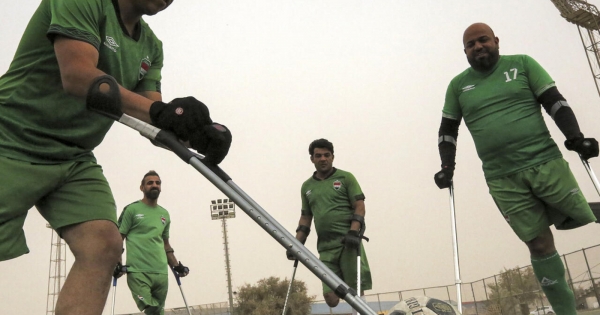After losing an arm or a leg in a war against the Islamic State that has ravaged Iraq for years, a group of young men find a glimmer of hope in an amputee football team that heals the wounds left in the body.
This team has thirty players and has managed to qualify for the Amputee Football World Cup to be held in Turkey at the end of 2022.
The idea of creating such a team was born by a young Iraqi, Muhammad Al-Najjar, while studying in the UK, where he opened a team for the disabled in Portsmouth. After returning to Iraq, he posted an announcement about the formation of the team on social networks.
He says: “Following this announcement, there were many offers to join the team, and I did not expect it, and we were able to create a team in August 2021.”
The 38-year-old lost his right leg in 2016 “while fighting against the Islamic State,” he told AFP.
At the time, like many of his teammates, Al-Najjar was a member of the Popular Mobilization Forces, an alliance of Shia militias mostly loyal to Iran that has become part of Iraqi official forces and plays a prominent political role in the country. .
Team members meet three times a week for training at the Al Shaab International Stadium in the capital.
Leaning on crutches, the players in the green uniform of the national team are running. After warming up the shoulders and wrists, the team practices shooting at the goal. The goalkeeper catches the ball with his stomach.
On one of the benches, a prosthetic leg is waiting for its owner.
– “Severe depression” –
Prior to the creation of this team, Al-Najjar says that “most of the players suffered from severe depression due to the events they were subjected to.”
Al-Najjar, an oil ministry official, added: “Some players have considered suicide due to the loss of a limb, and before that they were professional players.”
But “now the situation is different,” he says, adding: “These players post photos of themselves with the team on social media pages and are proud of their achievements.”
The team consists of 20 players from Baghdad, 10 from Basra and another 5 from Najaf, two major southern cities where the team sometimes trains.
According to the rules of the game, in official competitions, matches are played with a team of seven players, and on an open area 60 meters long and 40 meters wide, gates are two meters high and five meters wide. In contrast, traditional football goals are 2.44 meters high and 7.32 meters wide.
Muhammad Ali’s dream since childhood was to become a goalkeeper. In 2007, as sectarian conflict raged, a young man lost his left arm in a car bomb explosion in Tahrir Square in the center of the capital. He was seven years old at the time and played for his age group Air Force Club, a military-funded team.
“In the team, I found a great opportunity to continue playing football,” says 22-year-old Ali. “Early in my career, I lost my arm.”
After his desperation, he says, “Now the team has brought me back to life.”
– How do I spend my life? –
In a country that has experienced a series of wars, conflicts and bloody stages of violence since the 2003 US invasion toppled Saddam Hussein’s regime, the state provides financial support to victims of attacks and battles against jihadists.
Players receive monthly salaries ranging from $400 to $700. But most players work every day to be able to cover their expenses for the whole month.
The team still faces a major hurdle – the lack of official recognition, which deprives them of financial support.
The International Amputee Football Federation has not yet joined the International Paralympic Committee, which means, according to the head of the Iraqi Paralympic Committee, Akil Hamid, the committee’s inability to “support the team and provide it with financial grants.”
As al-Najjar explains, this team typically relies on donations from charities to provide equipment, sportswear and training requirements, and on its overseas trips and trips, it relies on financial assistance provided by the People’s Mobilization Office.
“Help us go to Iran by buying plane tickets,” says Al-Najjar, hoping the team will get “great support.”
A 2006 car bomb explosion in Baghdad ended Ali Kadhim’s ambition to become a professional footballer. He lost his left leg and left the Air Force team he played for.
“I was constantly thinking about how I would spend my life among people while I was in a difficult and difficult state of health,” says the 38-year-old father of three.
But today the team gave him hope and says that his sons are one of his biggest fans, “they are preparing all the conditions so that I can go to training, and thanks to them I got rid of a big disappointment.”
Source: El Iktisad
